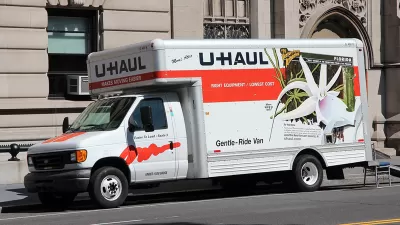Millenials

29 Resources for Onboarding New Planning Employees
New hires are the focus of the Great Reshuffle. While it's tempting to focus on tasks, a balanced onboarding program should also explain how a planning agency's values and policies align with theory and practice. Here are 29 conversation starters.

'Move to Buffalo' Is No Excuse
One common argument against building new housing in high cost cities is that people priced out of those cities can always move somewhere cheaper. This post responds to that claim.

Millennials Prefer Revitalized Historic Areas, Not Malls
Are millennials the key to preservation? A new survey finds that millennials prefer to live, work and play in neighborhoods with historic buildings.

The Next Baby Boom: Urban Millennials with Children
Affordable urban living for millennial families with children has the potential to become one of the largest market demands in the near future.

Tuesday's Election May Hinge on the Changing Demographics of Suburbs
Today's suburbs have changed dramatically from a generation ago. Younger, more diverse, and more liberal, they are "trending more Democratic." The PBS News Hour explores this critical demographic shift five days before Election Day.

Mapping The Movement of *Some* Millennials
The in-migration of Millennials is largely driving the changes that American cities are going through. More specifically, it is the ones with college degrees who are driving the change. Where are they moving, and what is their effect?

Do Millennials Opt for Cities or Suburbs? Yes.
Recent stories claiming that millenials either (a) prefer cities to suburbs or (b) prefer suburbs to cities both have some basis in reality.

Does America Still Want Sprawl?
Increased awareness of sprawl’s negative effects has not led to a drop-off in its construction. Developers say they only build what the market demands.

Are Millennials Different, or Just Delaying Homeownership?
Big, diverse, and a little bit different, the Millennial generation is often cast as the solution to—or the cause of—many of America’s housing challenges.

If Millennials Drive Less, it's Not All a Matter of Taste
Bill Fulton writes for CP&DR that while some Millennials may be driving less because they've chosen urban, transit-friendly lifestyles, many more young people are driving less simply because they can't afford to.

Why Millennials Opt to Rent
Sandie Angulo Chen of Trulia discusses the reasons why Millennials prefer to rent homes or apartments instead of buying properties.
Millennials in Government
A new report on millennials working in the federal government was released earlier this week by the U.S. Office of Personnel Management, detailing the trends associated with this young generation of employees.
Unbundling Parking Costs to Keep Families in Cities
Cities tend to attract Millennials, but as the saying goes, when they get older and start families, off they go to the suburbs! Seattle developer and author A-P Hurd promotes parking unbundling as a key strategy enabling families to remain in cities.

Mission Accomplished? Not Yet
Even if today's renters and homebuyers are more likely to want urban life and walkable neighborhoods than their parents, plenty of political obstacles stand in their way.
Who Is Migrating To Cities?
Millenials really are migrating to cities in large numbers- but older age groups are merely leaving less rapidly than in the past.
Who's Returning To The City
Are children, millenials and baby boomers returning to cities? The best answer: sometimes, sometimes, and maybe not.

Enliven Nightlife to Attract Millenials
Montgomery County wants to be the life of the party. To do so, it's establishing a special taskforce to boost its nighttime economy and attract millenials, reports Bill Turque.
The Psychology Driving the Great Urban Migration
Nathan Norris explores what planners need to know about the trends driving Generation Y's quest for urban living and America's evolving housing market.
Housing and Resilience
As part of its "Future Tense" initiative with the New America Foundation, Slate is exploring the concept of resilience. In this article, Patrick Doherty makes the case for improving America's resilience by reconsidering suburban development.
ULI Says Demand for Multifamily Housing is Real
Housing preferences are shifting dramatically to smaller, multifamily dwellings, creating a dramatic mismatch between housing supply and demand, according to a new report from the Urban Land Institute.
Pagination
Urban Design for Planners 1: Software Tools
This six-course series explores essential urban design concepts using open source software and equips planners with the tools they need to participate fully in the urban design process.
Planning for Universal Design
Learn the tools for implementing Universal Design in planning regulations.
Heyer Gruel & Associates PA
JM Goldson LLC
Custer County Colorado
City of Camden Redevelopment Agency
City of Astoria
Transportation Research & Education Center (TREC) at Portland State University
Jefferson Parish Government
Camden Redevelopment Agency
City of Claremont


































